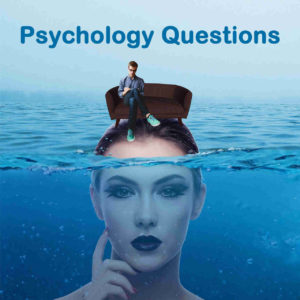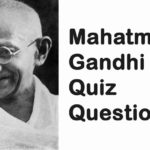100 Psychology Quiz Questions and Answers

Top 100 General Psychology Quiz Questions and Answers Part 1
1) What is Psychology?
Answer: It is the scientific study of mental processes and behavior.
2) Who observes and records that how people and other animals relate to one another and to the environment?
Answer: Psychologist.
3) A broad field that explores a variety of questions about thoughts, feelings and actions is:
Answer: Psychology.
4) Systematic assessment that providing information on political views, consumer buying habits and many other topics is called:
Answer: Survey.
5) An examination for which average levels of performance have been established and which has shown consistent results is:
Answer: Standardized test.
6) Psychologists use which test to help to measure abilities, aptitudes, interests and personality traits?
Answer: Standardized test.
7) Which tests yields clues to a person’s inner feelings?
Answer: Projective tests.
8) Which helps a psychologist to discover or confirm cause – and – effect relationship in behavior?
Answer: Experimentation.
9) Which method enables scientists to test a theory under controlled conditions?
Answer: Experimental method.
10) The origins of psychology are often traced to the ancient Greek philosopher, who was chiefly interested in what the human mind could accomplish:
Answer: Aristotle.
11) Who believed that the mind or soul was separate from the body?
Answer: Aristotle.
12) The word psychology comes from the Greek words:
Answer: Psyche and logia.
13) The word Psyche means:
Answer: Mind or soul.
14) Logia means:
Answer: Study.
15) Which philosopher described the body and mind as separate structures that strongly influenced one another?
Answer: René Descartes.
16) The belief of Descartes that people were born with the ability to think and reason, is called:
Answer: Nativism.
17) Nativism was rejected in the late 1600’s and early 1700’s by a group, of philosophers called:
Answer: Empiricists.
18) Who were began the first systematic studies of sensation and perception?
Answer: Johannes P. Muller and Hermann von Helmholtz.
19) When was the first systematic studies of sensation and perception began?
Answer: Mid 1800’s.
20) Who was Johannes R Muller?
Answer: German physiologist.
Online Psychology Quiz Questions and Answers Part 2 (Quiz 21-40)
21) Who was Hermann von Helmholtz?
Answer: German physicist and physiologist.
22) Who founded the world’s first psychology laboratory?
Answer: William James.
23) When was the first psychology laboratory founded?
Answer: 1875.
24) Psychology laboratory was established in Germany in:
Answer: 1879.
25) Who established psychology laboratory in Germany?
Answer: Wilhelm Wundt.
26) Who published the first journal of experimental psychology?
Answer: Wilhelm Wundt.
27) Whose works were marked the beginning of psychology as a distinct field from philosophy?
Answer: Wilhelm Wundt and William James.
28) From the late 1800’s until the 1930’s, psychologists developed four major schools. What are they?
Answer: Structuralism, behaviorism, Gestalt psychology and psychoanalysis.
29) Structuralism grew out of the work of:
Answer: Wundt James and their associates.
30) The structuralist primarily used a method of research called:
Answer: Introspection.
31) When was Behaviorism introduced?
Answer: 1913.
32) Who introduced Behaviorism?
Answer: John B. Watson.
33) Who was John B. Watson?
Answer: An American psychologist.
34) Who believed that observable behavior was the only reliable source of information?
Answer: John B. Watson and his followers.
35) Whose work influenced behaviorist movement?
Answer: Ivan Pavlov.
36) Who was Ivan Pavlov?
Answer: Russian physiologist.
37) The learning process by which a response becomes associated with a new stimulus is called:
Answer: Conditioning.
38) Name the American psychologist who gained much attention for behaviorist ideas during the mid 1900’s?
Answer: B.F. Skinner.
39) Which book of B.F Skinner describes how the principles of conditioning might be applied to create an ideal planned society?
Answer: Walden Two.
40) Gestalt psychology developed as a reaction against:
Answer: Structuralism.
Psychology Quiz Questions and Answers Part 3 (Quiz 41-60)
41) The German word Gestalt means:
Answer: Pattern, form or shape.
42) Who believed that human beings and other animals perceive the external world as an organized pattern, not as individual sensations?
Answer: Gestalt psychologists.
43) Quote the familiar saying which expresses an important principle of the Gestalt movement?
Answer: “The whole is greater than the sum of its parts”.
44) When was Gestalt psychology founded?
Answer: About 1912.
45) Who founded Gestalt psychology?
Answer: Max Wertheimer.
46) Who was Max Wertheimer?
Answer: German psychologist.
47) When was Wertheimer and two colleagues brought the Gestalt movement to the United States?
Answer: 1930’s.
48) When did psychoanalysis was founded?
Answer: Late 1800’s and early 1900’s.
49) Who founded the psychoanalysis?
Answer: Austrian physician Sigmund Freud.
50) Psychoanalysis was based on the theory that:
Answer: Behaviour is determined by powerful inner forces.
51) The repressed feelings can cause:
Answer: Personality disturbances, self-destructive behaviour or physical symptoms.
52) Who developed the method called ’free association’?
Answer: Sigmund Freud.
53) Through which method the patient relaxes and talks about anything that comes to mind while the therapist listens for clue to the person’s inner feelings?
Answer: Free association.
54) Which school of psychology helps the patient to understand and accept repressed feelings and find ways to deal with them?
Answer: Psychoanalysis.
55) Which group of behaviorists believe all behavior is a series of responses to different, stimuli?
Answer: Stimulus-response school.
56) A group of psychologists who believe that there is more to human nature than a series of stimulus response connections:
Answer: Cognitive school.
57) Which school of modern psychology developed as an alternative to behaviorism and psychoanalysis?
Answer: Humanistic psychology.
58) “To help people to function effectively and fulfill their own unique potential” is the aim of:
Answer: Humanistic psychology.
59) The chief professional organization for psychologists in the United State is:
Answer: American Psychological Association (APA).
60) Headquarters of the APA are located in:
Answer: Hyattsville, Maryland.
Psychology Quiz Questions and Answers Part 4 (Quiz 61-80)
61) Abnormal psychology is:
Answer: The scientific study of psychological disorders.
62) The field of abnormal psychology is sometimes called:
Answer: Psychopathology.
63) A kind of case study that describes the behavior and thought patterns of one person is:
Answer: Ideographic study.
64) Name the study which examines the behavior and thought patterns common to many people who suffer the same disorder:
Answer: Nomothetic study.
65) Theories of abnormal psychology describe:
Answer: Mental illness, suggest their possible causes and propose certain methods of treating them.
66) The theories of abnormal psychology can be divided into four main groups or schools. What are they?
Answer: Biophysical, intrapsychic, existential and behavioral.
67) Which theory emphasize the importance of underlying physical causes of psychological disturbances?
Answer: Biophysical theory.
68) Which are the two main groups included in psychological disturbances?
Answer: Those due to medical condition, those related to the use of drug or medication.
69) Which theory focus on the emotional basis of abnormal behaviour?
Answer: intrapsychic theories.
70) Which theorists believe that conflict in early childhood cause people to worry or have other unpleasant feelings throughout life?
Answer: Intrapsychic theorists.
71) What is the term used by psychologists to describe people who sometimes behave abnormally but can usually cope with everyday problem?
Answer: Neurotic.
72) individuals who lose track of reality are called:
Answer: Psychotic.
73) Some psychotics believing in very unrealistic ideas are called:
Answer: Delusions.
74) Psychotics think perceptions such as “hearing voices” or “seeing visions” are real, called:
Answer: Hallucinations.
75) Which treatment is often used to help neurotics and psychotics to understand and resolve their conflicts and anxieties?
Answer: Psychoanalysis.
76) In which technique, the patient talks to the analyst about whatever thoughts, images or feelings come to mind?
Answer: Free association.
77) Which theory of abnormal behavior stresses the importance of current experiences and the person’s view of himself or herself?
Answer: Existential theories.
78) Which theory of abnormal psychology emphasizes the effects of learning on behavior?
Answer: Behavioral theories.
79) Behaviorists use a learning process to change abnormal behavior called:
Answer: Conditioning.
80) Through which process, behaviourists treat disturbed people by teaching them acceptable behavior patterns and reinforcing desired behavior by rewards and punishments?
Answer: Conditioning.
100 Psychology Quiz Questions and Answers Part 5 (Quiz 81-100)
81) In ancient times disturbed individuals were sent to dismal institutions, namely:
Answer: Insane asylums.
82) Which book of Emil Kraepelin, a German psychiatrist, classified various mental illnesses according to their specific types of abnormal behaviors?
Answer: Kompendium der Psychiatrie (A Textbook of Psychiatry, 1883).
83) Clinical psychology is:
Answer: The scientific study, diagnosis and treatment of people who have psychological problems adjusting to themselves and the environment.
84) Clinical psychologist’s chief activities are:
Answer: Testing and diagnosis, psychotherapy and consultation and research.
85) Which is the clinical psychologist’s chief tool in treating mental disorders?
Answer: Psychotherapy.
86) What is an important goal of clinical psychologists?
Answer: Understanding and preventing mental disorders.
87) Comparative psychology is:
Answer: The study of differences and similarities in the behaviour of animals of different species.
88) What are included in the study of comparative psychologists about the principal behavioural patterns of animals?
Answer: Communication, learning, migration orientation, reproductive behaviour and social behaviour.
89) Which study of comparative psychologists is the sharing of information among animals?
Answer: Communication.
90) Which study of comparative psychologists concerns the gaining of knowledge?
Answer: Learning.
91) What is Migration?
Answer: Is the travel of large group of animals.
92) Which study of comparative psychologists consists of the ways that animals position themselves in reaction to light, heat and other forces?
Answer: Orientation.
93) Reproductive behaviour concerns:
Answer: The mating habits of animals and the ways they care for their young.
94) Which study of comparative psychologists consists of group activities, such as the flocking of birds?
Answer: Social behaviour.
95) Developmental psychology is:
Answer: The study of changes in behaviour during life time.
96) Many developmental psychologists specialize in the study of:
Answer: Children or adolescents.
97) Which are the four main theories of child development that psychologists use in research on the behavior of children?
Answer: Maturational theory, psychoanalytic theory, learning theory and cognitive theory.
98) Which theory of child development states that the chief principle of developmental change is maturation, especially of the nervous system?
Answer: Maturational theory.
99) According to maturational theory, what is meant by physiological ripening?
Answer: Maturation.
100) A leading American supporter of maturational theory, who found that the growing child’s behaviour seems to follow a set developmental pattern is:
Answer: Arnold Gesell.
Read more > Quiz Questions and Answers


One Comment
Leave a Reply